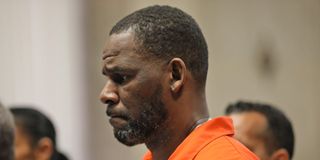R. Kelly’s convictions and 30-year sentence upheld by U.S. appeals court

What you need to know:
- The 2nd U.S. Circuit Court of Appeals in Manhattan issued its decision following arguments heard last March.
R. Kelly’s convictions for racketeering and sex trafficking, along with his 30-year prison sentence, were upheld on Wednesday by a federal appeals court, which ruled that the American singer exploited his fame for over a quarter of a century to sexually abuse girls and young women.
The 2nd U.S. Circuit Court of Appeals in Manhattan issued its decision following arguments heard last March.
The Grammy-winning, multi-platinum-selling R&B artist was convicted in 2021 in a Brooklyn federal court on multiple charges, including racketeering and sex trafficking.
Jennifer Bonjean, Kelly’s attorney, stated that she believed the Supreme Court would agree to hear an appeal. She criticised the 2nd Circuit’s ruling as “unprecedented,” arguing that it grants prosecutors unlimited discretion to apply the racketeering law “to situations absurdly remote” from the statute’s original intent.
Last year, the Supreme Court declined to hear an appeal against a 20-year sentence Kelly received following his 2022 conviction in Chicago for child sex offences, including the production of images of child sexual abuse.
The 2nd Circuit rejected Kelly’s claims that the trial evidence was insufficient, that the constitutionality of some state laws used against him was questionable, that four jurors were biased, that the trial judge made improper rulings, and that the application of racketeering laws—more commonly associated with organised crime—was inappropriate.
“For over twenty-five years, Kelly, enabled by a network of managers, assistants, and other staff, exploited his fame to lure girls and young women into his control,” the appeals court stated, noting that members of his entourage facilitated introductions to underage girls.
"Evidence at trial demonstrated that he isolated them from friends and family, controlled nearly every aspect of their lives, and subjected them to verbal, physical, and sexual abuse," the three-judge panel concluded.
The court ruled that it was “neither arbitrary nor irrational” to allow testimony from multiple accusers who stated that Kelly had infected them with herpes without disclosing his condition. It further determined that testimony from seven witnesses, who were minors at the time of the alleged abuse, was not unduly prejudicial or excessive.
"None of the testimony was more inflammatory than the charged acts," the court said.
The 2nd Circuit also upheld the trial judge’s decision to allow jurors to view graphic video evidence, ruling that the footage was “properly admitted to illustrate the means and methods of the enterprise, including the level of control and dominance Kelly exercised over his victims.”
Bonjean also cited a partial dissent by one judge, Richard J. Sullivan, who largely concurred with the majority’s “excellent opinion” but dissented in part regarding a restitution award. He objected to a ruling that granted one victim a lifetime supply of herpes medication, arguing that the cost was calculated based on a brand-name drug despite the availability of a cheaper generic alternative.
“This was not restitution. This was an attempt by the government to unjustly enrich its witnesses in exchange for their testimony,” Bonjean stated.
Born Robert Sylvester Kelly, the singer is best known for his 1996 hit I Believe I Can Fly and the cult classic Trapped in the Closet, a multipart saga of sexual betrayal and intrigue.
Despite longstanding allegations of his abuse of young girls, Kelly continued to sell millions of albums and remained in demand throughout the 1990s and 2000s. He was acquitted of child sexual abuse image charges in Chicago in 2008, but a second trial in 2022 resulted in his conviction for producing child sexual abuse images and enticing minors for sex.
Widespread public condemnation of Kelly’s misconduct only gained momentum during the #MeToo movement, reaching a peak after the release of the documentary Surviving R. Kelly.




